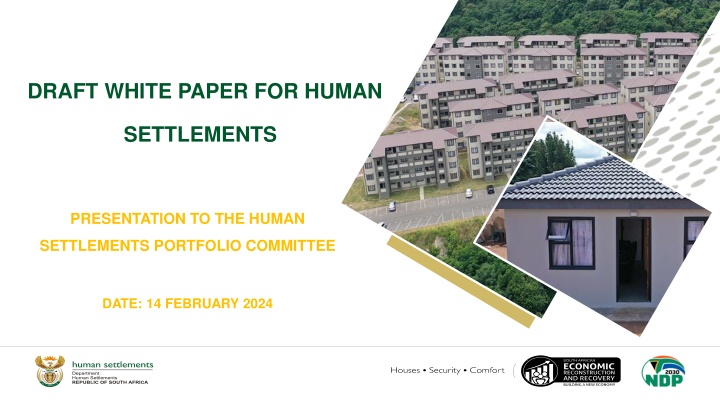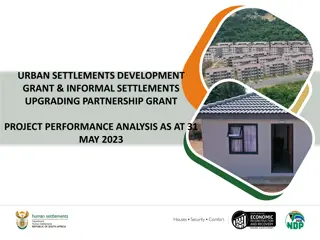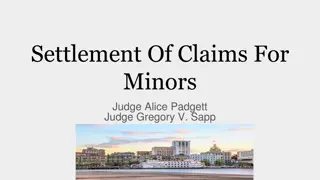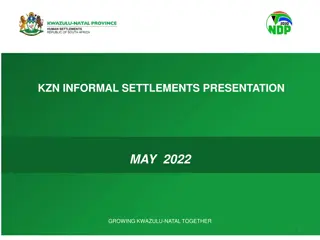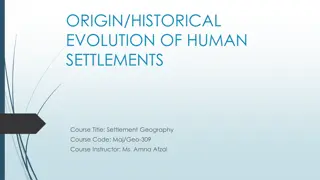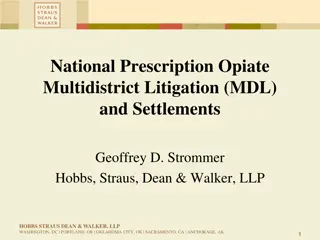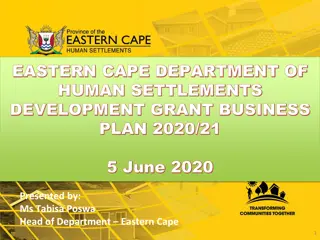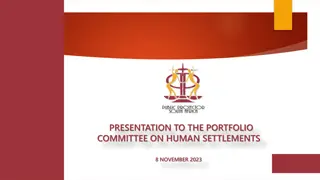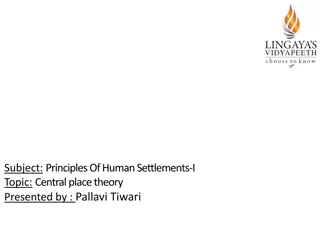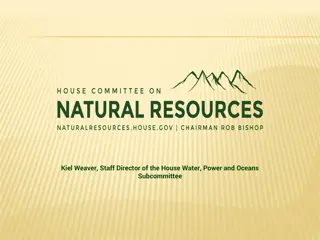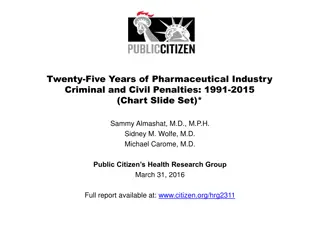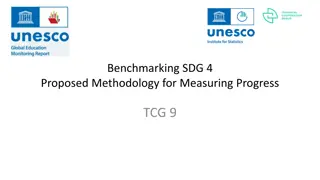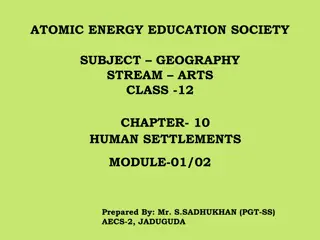Development of Human Settlements White Paper: Progress and Strategic Objectives
In the presentation to the Human Settlements Portfolio Committee, the progress and strategic objectives of the Human Settlements White Paper are outlined. The content covers the purpose, evolution of housing, problem statement, strategic foundation, policy context, key objectives, principles, and key policy proposals. The document aims to address challenges in housing delivery, role clarity, spatial transformation, and economic contributions towards sustainable human settlements.
Download Presentation

Please find below an Image/Link to download the presentation.
The content on the website is provided AS IS for your information and personal use only. It may not be sold, licensed, or shared on other websites without obtaining consent from the author.If you encounter any issues during the download, it is possible that the publisher has removed the file from their server.
You are allowed to download the files provided on this website for personal or commercial use, subject to the condition that they are used lawfully. All files are the property of their respective owners.
The content on the website is provided AS IS for your information and personal use only. It may not be sold, licensed, or shared on other websites without obtaining consent from the author.
E N D
Presentation Transcript
DRAFT WHITE PAPER FOR HUMAN SETTLEMENTS PRESENTATION TO THE HUMAN SETTLEMENTS PORTFOLIO COMMITTEE DATE: 14 FEBRUARY 2024
TABLE OF CONTENTS Purpose Evolution of Housing Overview of the White Paper Problem Statement Strategic Foundation Policy Context Key Objectives Principles Policy Shift Key Policy Proposals Preliminary Consultations Progress to Date Strategic Consultations Preliminary Written Inputs Future Milestones Recommendations o o o o o o o o o o o o o o o o 2
PURPOSE The purpose of the presentation is to apprise the Portfolio Committee on Human Settlements on: The progress made towards the development of the Human Settlements White Paper and solicit input; Gazetting and consultative process underway; Future milestones 3
OVERVIEW An outcome to a series of programme evaluations and expenditure reviews in partnership with the DPME and the National Treasury reflecting on the scope, scale, and pace of housing development. Sets out new vision, objectives, theory of change, key policy statements, policy position, roles, and responsibilities of stakeholders towards integrated sustainable human settlements. White Paper for Human Settlements seeks to create an enabling environment for development of integrated and sustainable human settlements. 7
PROBLEM STATEMENT Persistent housing delivery picture - Absence of clear directives of what constitutes human settlements and a lack of role clarification, responsibility and accountability continue to hinder the development of human settlements. Current Housing Act focuses on housing - Lack of policy and legislative basis of what constitutes a human settlement. Economic contribution Poor understanding of a government subsidised house as an asset for wealth creation by beneficiaries. Lack of Spatial Transformation: Need to systematically respond to entrenched spatial pattern across all geographic scales that exacerbate social inequality and economic inefficiency. 8
STRATEGIC FOUNDATION The strategic focus of the White Paper takes into consideration the programmes and priorities of government, and aligns with the existing macro policies such as: 1.Constitution of the Republic of South Africa Section 26 which establishes the right of access to adequate housing. 2.Sustainable Development Goals (SDGs) Goal 11 which seeks to plan cities and human settlements opportunities for all, with access to basic services, energy, housing, transportation and green public spaces, while reducing resource utilisation and environmental impact. 3.National Development Plan (NDP) Chapter 8 focusing on sustainable human settlements and improved quality of household life 9
POLICY CONTEXT Sector underwent fundamental policy, legislation and structural reforms in the past twenty years. Significant functional shifts including the expansion of the Department s mandate from housing to human settlements. Macro-planning environment demonstrated significant changes - the state re-visited manner in which delivery targets are developed responsibilities. and assignment of 11
POLICY CONTEXTCONT The prevailing notion that the right of access to adequate housing requires the State to build housing for the population, and that people without housing can automatically demand a house from the state constitutes mis- interpretation; Fundamentally, the right of access to adequate housing does not oblige the Government to construct a house for every citizen; Rather, the right of access to adequate housing covers measures that are needed to prevent homelessness, prohibit forced evictions, address discrimination, focus on the most vulnerable and marginalized groups; Such measures require intervention from the government at various levels, viz. spending priorities; legislative, administrative interventions.
POLICY CONTEXT..CONT Draft White Paper policy seeks to address the prevailing gaps and inconsistencies in the housing and human settlements sector Seeks to respond comprehensively to contemporary local and international reforms; Seeks to adequately respond to integrated planning strategies (e.g. DDM), amplify the role of the private sector, improve public environment, requisite institutional capacity and active citizen participation as instruments for sound and effective policy frameworks. 13
KEY OBJECTIVES Alignment: To address the embedded policy, legislative and programme design gaps as well as regulatory inconsistencies to reflect contemporary reforms including reconciling it to international Treaties, Agreements and Declarations. Integration: To promote alignment in development planning, while progressively developing governance and administrative capacity through sustainable human settlements delivery approaches. Innovation and flexibility: To create legislative framework to harness innovative and transformative approaches through creation of human settlements. Inclusiveness: To promote human settlements systems that function as a whole. 14
PRINCIPLES 1. Equity: The policy prioritises the allocation of subsidies based on transparent and objective criterion. 2. Affordability: Adequate funding and a variety of support options will be allocated as subsidy instrument to address the financial burden impacting low-income households 3. Administrative efficiency: Administrative processes are streamlined to ensure timely and efficient service delivery. 4. Quality assurance: emphasis on meeting statutory standards including safety, durability, and liveability. 5. Partnerships and people-centred development: processes to enableactive citizen participation in need identification, planning and implementation 6. Promotion of innovation in human settlements development 7. Collaboration, coordination and communication: serveas the important protocols 15
POLICY SHIFT: Housing to Human Settlements Development of the overarching policy framework to respond to the macro-planning environment including roles, responsibilities and functions of different spheres of government Recalibrate the grant funding frameworks to optimize performance of existing grant instruments Inform amendment of the of the Housing Act and provide rationale for the new Human Settlements Development Act 16
POLICY PROPOSALS Priority to be given to vulnerable groups- the elderly, child-headed families, and people living with disabilities KEY POLICY PROPOSALS OF THE DRAFT WHITE PAPER Collaborative review of the current land administration to embrace the empowerment of women to access land and land titles. Exploration of a quicker, simplified, and less costly process of registration and transfer of land and property for poor households Review and adjust the pre-emptive right clause to ensure upward mobility and curb the informal transactions of subsidised houses. 17
POLICY PROPOSALS Engaging beneficiaries in decision-making processes to foster a sense of ownership and empowerment among residents, thereby contributing to KEY POLICY PROPOSALS OF THE DRAFT WHITE PAPER sustainable outcomes. Informal settlements upgrading- advocacy will be towards the prioritization of participatory planning and implementation Will promote in-situ upgrading - incremental upgrading and relocation will be a last resort consideration. Backyard housing - firm up necessary regulatory measures amenable to building standards; the formalization and the provisions of the required internal infrastructure. 18
POLICY PROPOSALS Social housing market- the principles anchor affordability, accessibility, safety, and contribution to socio-economic growth whilst effectively addressing demand and contributing to spatial restructuring KEY POLICY PROPOSALS OF THE DRAFT WHITE PAPER Consideration of cost-effective construction methods - building materials (IBTs), and technological advancements e.g. Digitised Housing Needs Register and M&E systems (e.g. swift response to emergencies and disasters Ensure that human settlement projects are contained within the urban edge of development nodes and strategic locations along the development corridors to curb sprawl Emphasis being placed on settlement design principles that produce safe, liveable, and inclusive spaces, resulting in an improved quality of life for all citizens. 19
PROGRESS TO DATE 29 November 2023 - Cabinet approval for public comment and gazetting 18 December 2023 - Gazette notice with Government Printers 24 January 2024 -Minister approved extension of public comments submission from 31 January 2024 to 28 February 2024 26 January 2024 - Extension of the closing date for public comments gazetted The document is available - DHS Website, Urban Knowledge Exchange of South Africa, Dear SA, Twitter, Facebook & WhatsApp Road shows with Provinces and Metros are in progress 21
STRATEGIC ENGAGEMENTS Targeted Consultative Sessions: SALGA, Built Environment Professions (CBE), National Treasury, Civil Society/NGOs, South African Cities Network Provincial DHS: All provinces have identified key stakeholders and have scheduled consultative sessions. WP Technical Working Group: Will comprise of among others, DHS Entities, COGTA, SALGA, DoT to consider inputs and promote integration 22
SCHEDULE OF UPCOMING CONSULTATIONS PROVINCE DATES Venue 1. North West 29/01/24 Virtual 2. Gauteng 31/01/24 Hybrid/ Gold Reef City 3 Western Cape (Province & Municipalities) 4. Western Cape (NGO s & Civil Society) 5. Northern Cape 9/2/2024 Virtual 12/2/2024 12 Hertzog Boulevard, City of Cape Town Kalahari Diner 15/2/2024 6. KwaZulu Natal 16/2/2023 TBC 7. Eastern Cape 19/2/2024 Hotel Osner 8. Free State 22/2/2024 President Hotel 9. Mpumalanga 23/2/2024 Gert Sibande Municipal Office 10. Limpopo 26/2/2024 TBC
PRELIMINARY WRITTEN INPUTS Various individuals COGTA National Treasury/Cities Support Programme Dept. of Social Development DWYPD Gauteng DCOG North-West DHS KZN DHS Institute of Human Settlement Practitioners South Africa University of Johannesburg The Public Affairs Research Institute University of Western Cape UN-Habitat 24
FUTURE MILESTONES Consolidation of inputs and revision of the White Paper Revised draft White Paper Requisite approvals Cabinet approval process 25
RECOMMENDATIONS It is recommended that the Portfolio Committee on Human Settlements notes: The progress made towards the development of the Human Settlements White Paper; Gazetting and consultative process underway Future milestones 26
THANK YOU www.dhs.gov.za Mypolicy@dhs.gov.za 27
